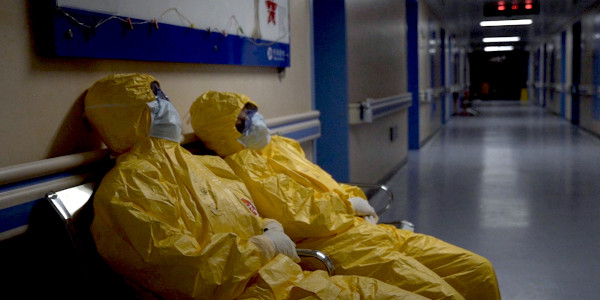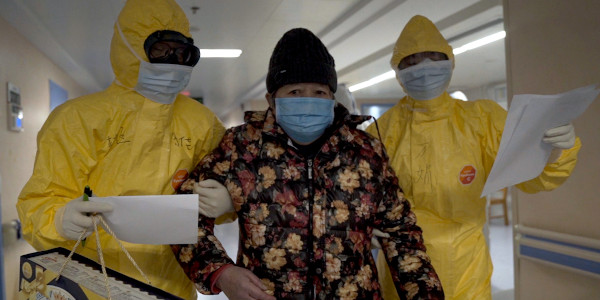Toronto International Film Festival 2020: 76 DAYS
Though a raw coronavirus documentary may not be at the top of anyone’s “to do” list right now, a pandemic-laden film festival wouldn’t be complete without at least one pandemic-focused film. That spot has been designated to 76 Days, the erratic, yet compassionate frontline documentary composed by one filmmaker – New York-based Hao Wu – and two Chinese journalists, both of whom will, in this review, remain anonymous.
The burdens, disappointments, and dangers of the pandemic are not lost on many. This cyclical containment is almost beyond words, and almost especially the polite ones. But as the problem has escalated to a global scale, transferring and inflaming civilizations across the planet (some longer than others), it becomes too easy to neglect the humanity involved in the crisis.
Taking place in the roots of the pandemic and shot mostly between the walls of a Wuhan hospital, 76 Days captures the panic, scramble and care behind the Chinese city’s two-and-a-half month-long lockdown. Sitting at a quick 93-minute runtime, the film is urgent and wrenching, unbashful in its presentation of tragedy and confusion. It’s aptly chaotic in both means and content, but securing the perspective of those braving the peril, the film manages to retain promise and hope. And I think our COVID conversations could use both.
A Time Not Too Long Ago
Losing a battle against an invisible foe, the lack of information or reconnaissance on the coronavirus has sort of become a byproduct of daily life, a disappointing, everlasting stressor. Of course, that’s a tad bit hyperbolic – fortunately, scientists around the world have yet to stop searching for answers and formulas – but with false negatives and rapid-fire testing diluting security, the severity of our disadvantage is overwhelming. Even so, it’s difficult to imagine a time where even less was known about the disease, let alone nothing.

As patient zero, that was the reality for Wuhan. Hospitals, congested with patients and tangled in admission and discharge processes, were left largely to fend for themselves. The government – which has also been scrupulous in censoring the narrative concerning their response to the pandemic – controlled what information was made available to health officials, severely hampering any isolation efforts.
Despite the aching need for exposure and, frankly, the narrative potential of this corruption, 76 Days makes the smart, economic play: let the world figure out the big stuff first and focus now on the individuals, the foot soldiers of this horrendous, once-in-a-lifetime event.
The film is a fly-on-the-wall account of pressure and perseverance, and its documentation is at once both unsettling and nuanced – every frame from the journalists’ cameras could, appropriately and possibly, be nominated for Pulitzer Prizes. The mostly unnamed characters include doctors, nurses, patients, and families. All are victims in this mess, and their collective tragedies make up 76 Days’ various vignettes. From the medical staff barricading a restless waiting room to a dementia patient trying to find his way back home, there’s a natural, claustrophobic aura at play (quarantined viewers watching the festival at home will be able to relate).
But in every case, from the volunteer doctors who selflessly leaped into the crisis and the new parents anxiously waiting to see their newborn child, the tiny glimpses of humanity and kindness – surgical glove balloons painted with good wishes and one nurse’s desire to break protocol and return every object possible to families – flourish.

Unfortunately, hazmat suits and patient confidentiality, combined with a too fluid structure, muddy the cohesiveness of these narratives. And similar to a feeling many audience members may have developed in their own lives, a lack of timestamps blend the duration of the crisis (who knows what day it is anymore anyway, right?). But our proximity to the conflict inflates its urgency, trumping the need for specifics.
Conclusion: 76 Days
The fact that 76 Days even exists can be seen as a miracle. Hostile censorship from the Chinese government has delayed the international absolution of the disease, and even its geopolitical tension with the United States harmed this film’s transpacific production. But if anything, the combined efforts of everyone onscreen – and certainly behind the camera as well – spotlight the larger, unsung compassion at play during this pandemic.
76 Days had its global premiere at the Toronto International Film Festival on September 14th. It is currently seeking distribution.
Does content like this matter to you?
Become a Member and support film journalism. Unlock access to all of Film Inquiry`s great articles. Join a community of like-minded readers who are passionate about cinema – get access to our private members Network, give back to independent filmmakers, and more.
Join now!




